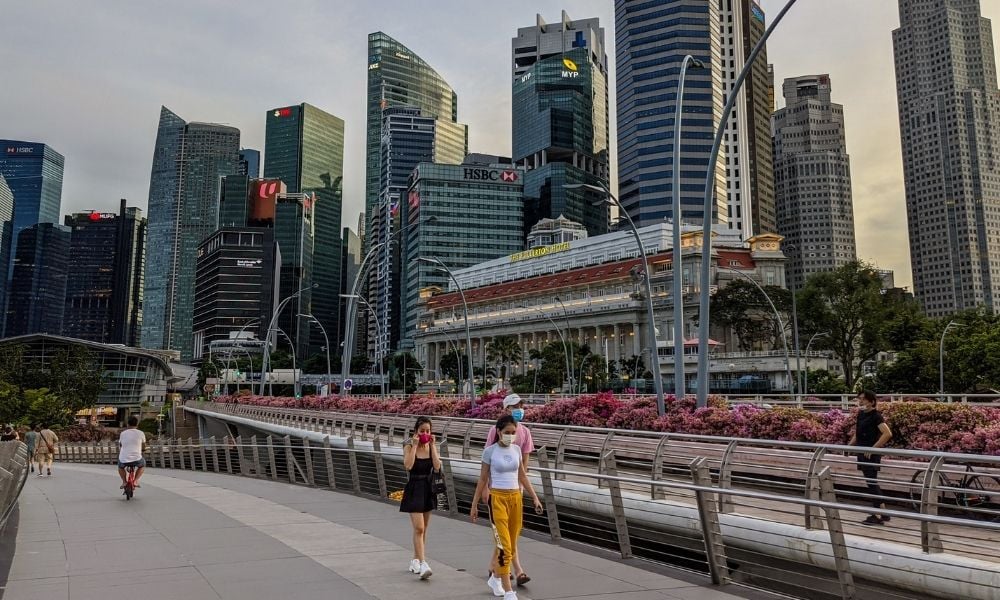
Support will be given to affected businesses

Employees who can work from home (WFH) should do so by default, according to the Ministry of Health (MOH), as Singapore intensifies their restrictions after increasing COVID-19 cases. The MOH said that WFH "will be the default for employees who are able to work from home" starting on September 27, an order that seeks to minimise workplace interactions among office staff.
In addition, the previously cut down 10-day snap WFH scheme is also suspended, cross-deployment of staff to multiple departments is also prohibited, while social gatherings at the workplace shall remain forbidden. For workers, contractors, and vendors who’re unable to work from home, they are "strongly encouraged" to self-test weekly via an Antigen Rapid Test (ART). Those who also need to return to the workplace may also do so after a negative ART result.
"Employers should continue to implement flexible working hours and stagger the start times of employees who need to return to the workplace," read the order from the MOH.
Meanwhile, food and beverage (F&B) establishments will only be allowed to accommodate fully vaccinated customers in their businesses. Children under the age of 12, recovered individuals, as well as unvaccinated customers with a valid negative pre-event test (PET) result are permitted to dine in pairs.
"F&B establishments that are not able to ensure that all dine-in patrons meet the criteria for full vaccination may only operate take-away and delivery services," the ministry said.
Read more: MOM expands vaccine policy to high-risk sectors
Live performances, recorded music, as well as videos/TV screening shall remain disallowed, while rules in hawker centres and coffee shops remain unchanged.
"Because hawker centres and coffee shops offer essential food services to the community, the concession to dine-in at these premises will remain at up to two persons, regardless of vaccination status," the ministry said. "Patrons to F&B establishments are also reminded to adhere to all safe management measures and keep their masks on at all times except when eating or drinking."
For larger events, such as congregational and worship services, cinemas, MICE, concerts, and spectator sport events, guests can reach up to 1,000 individuals as long as they are all vaccinated. If not, only up to 50 attendees are allowed without PET.
Marriage ceremonies are still allowed, however groups need to be seated in pairs. If not, only up to 50 attendees are permitted to join without PET.
"We acknowledge that wedding couples have faced significant uncertainties over the past few months. Hence, as a special concession, wedding receptions may be allowed to continue with up to 250 attendees if all are fully vaccinated, and with a group size of up to five persons per table," the ministry said.
"All wedding guests must strictly abide by the safe management measures, and in particular maintain social distancing and avoid mingling with others beyond their own table," it added, saying elderly and unvaccinated individuals are discouraged from joining such events.
Read more: Singapore's VoRT regime: What HR needs to know
The MOH said the measures will take effect on September 27 and will last until October 24, with the government enhancing its Job Support Scheme aid to 25% during the duration of the restrictions. Covered by the extended aid are F&B, retail, cinemas, museums, art galleries, historical sites, family entertainment, tourism, gyms and fitness studios, as well as performing arts, arts education, and more.
Qualified tenants on government-owned commercial properties will have their rents waived for two weeks, while occupiers of private-owned commercial properties will receive a two-week rental relief cash payout under the Rental Support Scheme. Market stallholders in centres managed by the National Environment Agency will also get a two-week rental waiver.
"To support taxi and private hire car drivers, we will also extend the COVID-19 Driver Relief Fund payout at $10 and $5 per vehicle per day in October and November 2021 respectively," the ministry said.
Overall, the support measures cost $650 million, which are funded from the "higher-than-expected" revenues. It will also not be drawn on past reserves, the ministry stressed.
Read more: Singapore offers more wage support amid strict 'phase 2'
The new measures come as Singapore tallies increasing number of COVID-19 cases, according to the MOH, attributing the hike to individuals with mild symptoms.
"This has put a strain on our overall healthcare and response system and on our healthcare workers, as many COVID-positive individuals with mild symptoms are seeking medical attention at our hospitals when it might not be necessary," said the ministry.
The MOH added that while these increasing cases are mild, this could lead to a growing number of infected people, especially among the elderly, who will need hospital care.
"Hence, there is a need to slow down community transmission. We will thus be tightening our community safe management measures until our overall healthcare and response capacity has been appropriately augmented," the MOH stressed.